Critchley Markers A-Z
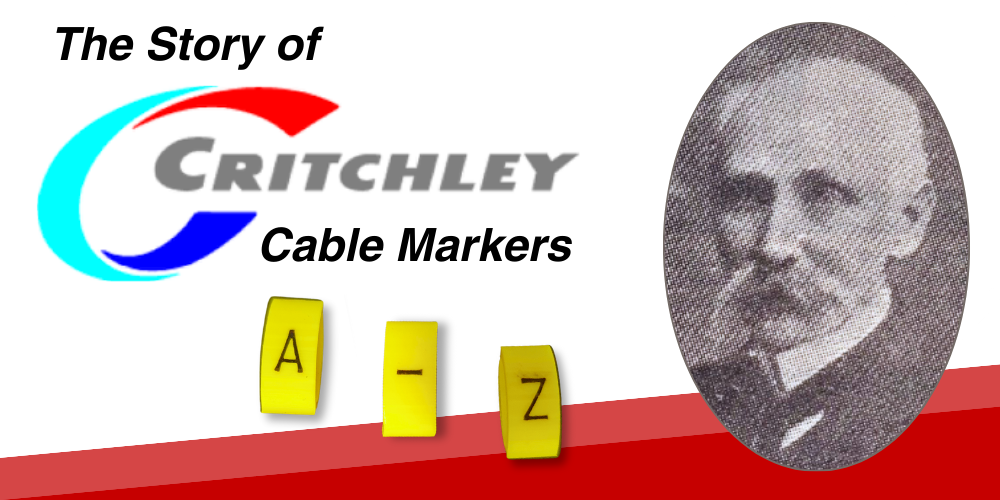
The Story of Critchley Cable Markers
Read time: 7 minutes
Perkins, Critchley, and Marmont
The Critchley legacy started with hardworking Henry Critchley, the son of Michael Critchley, a farmer and maker of farming tools. In 1832, young Henry Critchley began his career as an apprentice at a pin factory at Lightpill Mills in Stroud, along with Albert Perkins, and Joseph Marmont. In 1846, the plant got moved to Birmingham, so they decided to start their own pin manufacturing business together. They started their business in a shed at the back of Ten Bells Inn at Frogmarsh Lane.
When it came to naming their venture, the trio faced a dilemma about the order of their names. Perkins and Marmont wanted fate to decide. Henry Critchley, known for his strong principles, declined the proposal to decide the company's name by tossing a coin. He insisted that gambling was not an appropriate way to make business decisions.
Demonstrating his assertiveness and commitment to fair play, Critchley insisted that his name be positioned centrally in the firm's title, thus avoiding the need for a bet and ensuring equal recognition among the partners. This decisive moment not only highlighted Critchley's strong moral compass but also set the tone for the company's ethical approach to business.
Their firm was thus named Perkins, Critchley, and Marmont.
In 1851, they moved to their premises to Frogmarsh Mills on Nailsworth Stream. Each partner had an important role. Perkins was in charge of manufacturing. Marmont focused on the local market. Critchley handled finance and overseas sales.
The Franco-Prussian war of 1870 was a turning point in their business. With the devastation of French pin factories, England, and particularly the Critchley business, saw a boom. Critchley's trips to Paris were successful and greatly improved their market position.
However, Henry Critchley's death in 1881 led to disputes over the partnership, reshaping the company into Perkins and Marmont.
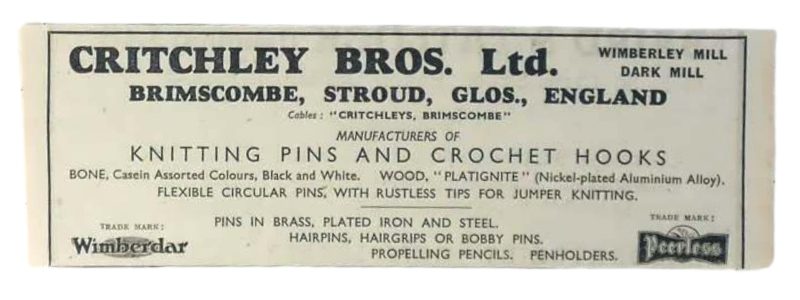
Image: Julian Shiel via Pictorial Gems
Critchley Brothers, Ltd.
Meanwhile, Henry's sons, Uriah and Francis Edward Critchley, ventured out on their own and founded Critchley Brothers, Ltd. in 1883 on the River Frome at Wimberley Mills and later expanding further with the adjoining Dark Mill in 1903. The new chapter in the Critchley story included new products, such as hairpins, knitting needles, and crochet hooks.
During World War I, the bulk of the plant was engaged on munitions, and towards its end a new plastic substance called Erinoid was invented and produced locally at the Lightpill Mills, where his father Henry Critchley apprenticed. Erinoid soon replaced bone for knitting needles and crochet hooks and eventually became the standard material for these products.
The true turning point came when D. N. Webster, a qualified electrician engineer, joined the Critchley business. With his vision, the company started making cable end ferrules. This move made them a leader in the electrical industry. This venture exploded into a variety of cable identification products, defining a new era for the company.
Recognising the changing needs of the market, the company made a strategic decision to keep a comprehensive stock of virtually all products. Because they had the ability to plan ahead, they could provide same-day delivery for most orders. This service played a major role in growing the electrical side of their business. This ability to anticipate customer needs and respond with agility was now a hallmark of the Critchley business.
The industries at Woodchester have come and gone; fortunately Critchley’s at Brimscombe has proved to be of a more resilient nature.

Critchley Group and Critchley Group plc
Continuing the remarkable journey of the Critchley family's enterprise, the latter part of the 20th century and the onset of the 21st century marked significant milestones that tied back to the foundational values and innovative spirit of the company. Critchley moved its headquarters to a larger premises on Nailsworth Stream only about 1km away from where the company first had its start.
In 1992, the Critchley Group became a public company called Critchley Group plc. This move symbolised a significant expansion and recognition of their evolving business. The company's decision to go public showed their commitment to growth, innovation, and global outreach. These principles have been part of the company since it began.

Tyco Electronics and TE Connectivity
The year 2000 marked another major transformation. Critchley Group plc was acquired by Tyco Electronics, now known as TE Connectivity, a global giant in the electronics industry.
When Critchley Group plc was acquired, they already had a strong global presence: 555 employees in the UK as well as operations in the US, Canada, Germany, France, Australia, Hong Kong, and Japan. The company's global presence shows its commitment to adapt and expand, echoing Henry Critchley's ventures abroad in the 1870s.
The acquisition of Critchley was a crucial step in expanding European operations and a significant growth opportunity for Tyco Electronics. This purchase was not just a business deal, but also combined Critchley's history and Tyco's technology, cementing the Critchley brand reputation as a pioneer in its field.
The Critchley journey from a modest shed in southern England to a prominent position in a global multinational company is a story of vision, resilience, and adaptability. The Critchley family's unwavering commitment to their business and their ability to embrace change while staying true to their roots have made Critchley Markers not just a commercial success but a symbol of enduring legacy and innovation in the industry. Today, as a supplier of Critchley Markers, we're not only offering a product but also a piece of this rich history with you.
Sources:
Critchley Markers Today
What are Critchley cable markers?
Critchley cable markers are the original cable marker. They are available in two types: K-Type and Z-Type. Constructed from self-extinguishing PVC, these markers are highly durable and resist numerous industrial fluids, making them adaptable to a wide array of settings. Critchley markers are versatile and can be used in various industries like oil, gas, and electrical.
What’s the difference between Critchley K-Type and Z-Type markers?
K-Type markers have an oval shape that are commonly used with K-Type carrier strips. They can also be applied directly to cable widths 4.0 to 10.0mm².
Z-Type markers are designed with an expanding profile to accommodate a wide range of wire and cable sizes. Nine sizes are available covering wire diameters from 1.5mm to 12.7mm. They can be used with a Teflon-coated application tool to help to reduce installation time. There are six applicator sizes for Z-Type markers sized 7 to 18.
What are carrier strips used for in the Critchley marking system?
Carrier strips are designed to securely hold K-Type markers, these strips vary in length and can accommodate up to 18 characters.
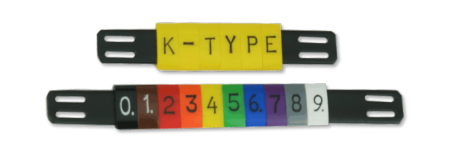
How do applicators enhance the use of Critchley Z Type markers?
The cable marker application tool can help you label faster, making sure z-type markers are put on firmly and in the right place.
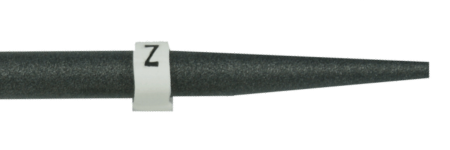
What colours are available for Critchley markers?
We take pride in offering a range of colours for Critchley markers at Express Electrical. These options ensure enhanced clarity and organisation.
K type markers come in yellow and white.
Z type markers are typically white, with a small range of clearance stock available in yellow.
Both K and Z type have numbered marker options in international colour code.
How are Critchley marker kits tailored to meet specific needs?
We understand our clients have different needs. That's why we offer a range of Critchley K-Type Marker Kits. Each kit is organised in a 50-compartment case for ease of use.
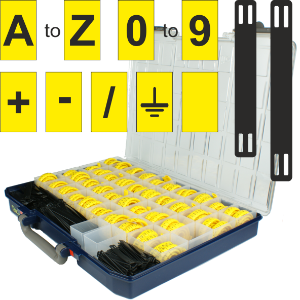
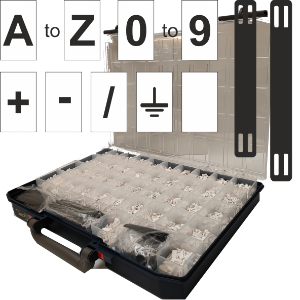
Do Critchley labels meet any specific standards or compliance requirements?
Critchley markers adhere to the stringent standards of BS 6746C: 1993 and IEC 60304. Capable of withstanding temperatures from -45°C to +70°C, they are suitable for diverse industrial conditions. Their RoHS compliance reaffirms our commitment to quality and environmental responsibility.
Is there a minimum order quantity for Critchley markers, and what are the delivery options?
We recognise the urgency of your requirements. Like Mr. Webster, we keep a large stock of virtually all Critchley products.
We offer free next-day delivery in the UK for orders over £50 placed before 3 pm. There is no minimum order quantity, so you can order as little or as much as you need.
We ship anywhere in the world and shipping is quoted separately based on the order weight and dimensions. Alternatively, you can arrange delivery with your own courier. Check out our Shipping Information page for further info.
Why choose Critchley markers for cable management?
Critchley cable markers are not just labels; they are a complete system for managing cables effectively and reliably. They are the perfect choice for industries looking for long-lasting, affordable markers. They have a wide range of options and can be customised to meet specific needs. Critchley markers are perfect for organising and labelling cables in rail, oil & gas, and electrical cabinet management.